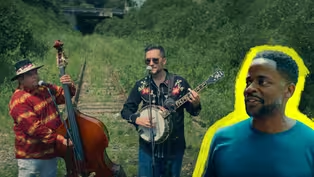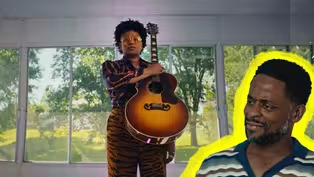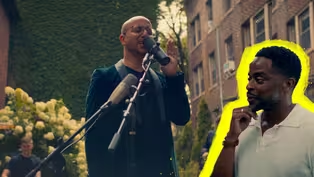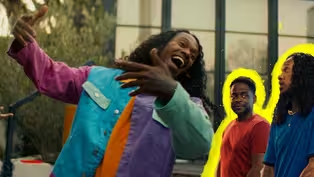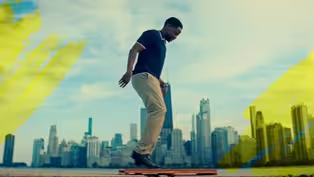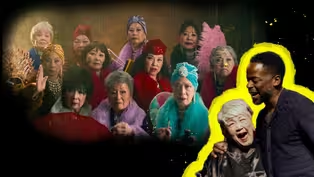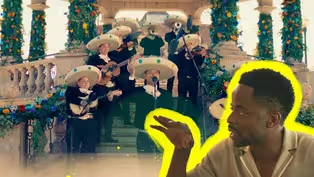
Fighting for the Right to Speak Spanish
Special | 8m 13sVideo has Closed Captions
A new play tells the story of a Latino student walkout that changed history in Texas.
In 1969, the Latino students of Crystal City, TX, staged a school walkout that sparked a revolution and changed history. The story inspired the play “Crystal City 1969” by Latinx theater company, Cara Mía Theatre.
Problems playing video? | Closed Captioning Feedback
Problems playing video? | Closed Captioning Feedback
This program was made possible by a grant from Anne Ray Foundation.

Fighting for the Right to Speak Spanish
Special | 8m 13sVideo has Closed Captions
In 1969, the Latino students of Crystal City, TX, staged a school walkout that sparked a revolution and changed history. The story inspired the play “Crystal City 1969” by Latinx theater company, Cara Mía Theatre.
Problems playing video? | Closed Captioning Feedback
How to Watch The Express Way with Dulé Hill
The Express Way with Dulé Hill is available to stream on pbs.org and the free PBS App, available on iPhone, Apple TV, Android TV, Android smartphones, Amazon Fire TV, Amazon Fire Tablet, Roku, Samsung Smart TV, and Vizio.
Buy Now
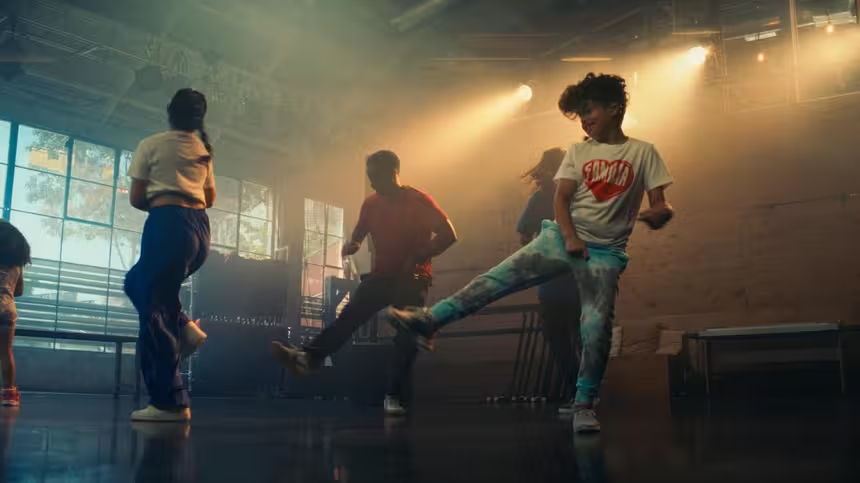
5 Artists Showcasing the Power of Art
From colorful cabarets and moving movies to artistic techniques that transcend the senses, here are five inspiring artists highlighted in The Express Way with Dulé Hill.Providing Support for PBS.org
Learn Moreabout PBS online sponsorshipMore from This Collection
This digital series follows Dulé Hill as he connects with diverse artists across America, exploring their history and letting us into their world on a deeper level.
Blending Latin Folk and Bluegrass Music
Video has Closed Captions
Larry & Joe are blending Latin folk and bluegrass music to show music has no borders. (16m 59s)
Finding Identity as a Black Appalachian Artist
Video has Closed Captions
Dulé Hill explores how music can provide solace and healing with musician Amythyst Kiah. (14m 51s)
Fighting for Syrian Refugees with Soul Music
Video has Closed Captions
A Syrian-American musician brings awareness to the civil war in his family’s homeland. (11m 32s)
Video has Closed Captions
Deaf dancer Shaheem Sanchez changes how Dulé Hill thinks about dance. (11m 42s)
Dulé Hill’s History of Tap Dance
Video has Closed Captions
Dulé Hill shares his motivation for mastering tap dance and carrying its legacy forward. (7m 45s)
Revitalizing Nightlife in San Francisco’s Chinatown
Video has Closed Captions
A multi-generational effort to preserve San Francisco Chinatown’s rich cultural history. (10m 3s)
Reimagining the Mariachi Charro Suit
Video has Closed Captions
Mariachi Arcoiris de Los Angeles reimagines the mariachi charro suit. (8m 36s)
Providing Support for PBS.org
Learn Moreabout PBS online sponsorship- Never fear!
- The Chicanos are here!
- Never fear!
- The Chicanos are here!
♪ David: The play "Crystal City 1969" represents the era of the fifties and sixties, in which Latino students were punished for speaking Spanish, physically punished.
I hope you all die before you turn 21, because... David: Slapped in the face.
Young girls, the principal would spank them with their bare hands.
Woman: Tell me, gente, are you angry?
All: Yeah!
I'm angry, too!
David: And so the students decided to mobilize and create new standards of education.
Reporter: What we witness has taken place all across the United States.
Man: We are the majority.
We can stop anything, and we can make anything in South Texas if we stick together.
Dulé Hill: Art is powerful.
♪ The Cara Mía Theater is one of the largest Latinx theater companies here in Dallas.
Their flagship production, "Crystal City 1969," tells the remarkable true story of Chicano student activists who sparked a revolution and changed history in the town of Crystal city, Texas.
David: How's it going?
Y'all getting people in?
Woman: Oh, my gosh, it's crazy.
¿Por qué?
¿Todo bien?
Yeah.
Todo bien.
Todo bien.
David: Cara Mía Theater is fighting every day.
And we're fighting for our youth.
We're fighting to tell our stories, to talk about our culture.
In a town of 80% Mexicano, who do they see when they open up their history books?
They see faces of White men.
So our plays begin to reveal these Latino experiences on stage.
David: Hey!
Dulé: How are you doing, sir?
David: Muy bien.
Dulé: Dulé Hill.
It is so wonderful to meet you all, to be in your presence.
Woman: Were you his student, too?
I was not, no, no, no.
I'm his student now, though, you see.
[Laughing] José: My name is José Ángel Gutiérrez.
I was born and raised in Crystal City.
There's a new political party in town.
José: Ever since college, these young people were talking about organizing an effective political advocacy group because there wasn't any in Texas for Mexican Americans.
We call ourselves Chicanos.
So we started organizing something called Mayo.
MAYO, Mexican-American Youth Organization.
Man: The Chicano group across the nation is starting to recognize the inequities of the school system.
Dulé: Facing racism and inequality in the schools, Latinx students across the United States and in Crystal City, Texas began to mobilize in 1969, hoping to create new standards of education.
Woman: We just want to be heard!
We just want to be heard!
One, Spanish is just as good as English.
We want bilingual education.
Man: Two, we want to choose our cheerleaders.
Woman: Three, teachers should stop calling us names.
Woman: Four, provide the band with new uniforms.
Woman 2: Let's go.
We got a petition going and we started with our principal.
I went and took the petition of 13 demands to the principal, and he looked at it and he said it was a bunch of baloney.
¡Ahí viene el principal!
Man: ¡Severita!
Severita suspended for passing out propaganda.
So we voted to have the school walkout.
We want our rights!
David: The impact of walkouts are that schools can't collect tax revenue from the state unless students are in class.
Dulé: Even beyond Texas, it's the same thing that the only thing that really gets people to respond or start to lean into your needs and your cause, is when it affects their pocket.
Man: That's right.
That is one thing that White people in Crystal City understand.
It's money.
Man: We're losing money here, sir.
We're reporting more and more absences every day.
Our deficit is growing.
Well, I won't be sitting around and negotiate with these bunch of teenagers who broke the rules.
José: I was the one that came as a lead organizer and recruited these folks.
Diana: She was 17.
He was 16, and I was 15.
Dulé: Mm-hmm.
You were only, like, 22 years old.
He was our mentor.
He helped us learn.
David: And they were very smart.
They were sending out press releases around the country.
They were writing letters, letting congressmen know, senators know about this.
So the longer it went, the worse it got for them.
And we also sent them out to register voters in the surrounding communities.
So they had pressure from all over.
And then these 3 were sent to Washington, D.C., and they raised all kinds of holy hell in Washington, D.C., about what was going on in Crystal City.
So you had the feds, the other communities, and the state agency telling our local gringos, "Settle this damn thing.
This is getting out of hand."
Man: These kids received a hero's welcome when they returned from Washington, D.C.. ¡Lo saben todos, gente!
[All cheering] Man: All eyes were on Crystal City.
The nation was watching.
David: There's a certain point of the walkout.
These teenagers started persuading their parents to run for office.
Man: If you don't run, we'd have the same gringo-run board.
And if you don't win, all those kids will flunk.
And by the time of the elections, Mexicanos took over the town, and Spanish was required to be spoken, read, and written from kindergarten to 12th grade.
All: We won!
Man: Ya ganamos.
Woman: We won the walkout!
Man: Almost all of our demands were met.
David: Theater connects to activism because the audience can experience the stories and the circumstances that they may not have lived through.
Dulé: I think Cara Mía and David have married activism with their art, and they are definitely showing the next generation how you can be passionate in your art and be passionate about your community and make a difference.
I lost friends and made some enemies in Crystal, but if I had to choose, I would do it all over again.
Gisela: Playing Severita, it made me a lot braver and made me more inclined to get into politics, to stand up for what is right.
I think art and history can really move people in the right direction now, and I think you learn a lot about your own community doing plays like this.
Severita: When the students from Crystal City went to see the play, busloads came in with parents and teachers and they came back, "You all did that."
Diana: Our stories have never been told.
Your stories have never been told.
There's a lot of people that contribute a lot to America.
We help build America.
Man: Remember Crystal, porque esta historia only lives in las memorias.
David: Theater creates a space where our stories can be told within a community setting.
[Cheering and applause] There's something about when you see yourself reflected that allows you to believe that you exist, that you matter.
José: This is the granddaughter.
Dulé: Can I get a five?
All right.
[Laughs] I feel that theater is a pillar of democracy, because it can't help but fire people up to be engaged.
It rattles people out of their comfort zone to say, "What else can I do?"
And it may only be incremental something.
It may be something very little that you do.
But if you have enough little things put together, it can make a very big difference.
Thanks for watching.
For more of "The Express Way" with me, Dulé Hill, you can tune in to the full length series on the PBS app or your local PBS station.
Check out the link in the description to watch a full episode and find out more about the show.
Support for PBS provided by:
This program was made possible by a grant from Anne Ray Foundation.
